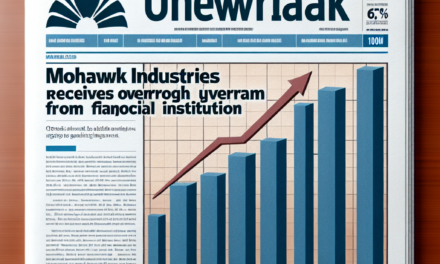“Fastenal Co.: Driving Efficiency, Building Tomorrow.”
Introduction
Fastenal Co., a leading distributor of industrial and construction supplies, has consistently drawn the attention of market analysts due to its robust business model and strategic growth initiatives. Analysts often highlight Fastenal’s extensive product range, efficient supply chain management, and strong customer relationships as key drivers of its market position. The company’s focus on technological integration and inventory management solutions, such as its vending machine program, has been praised for enhancing operational efficiency and customer satisfaction. Additionally, Fastenal’s financial performance, characterized by steady revenue growth and profitability, is frequently analyzed in the context of broader industry trends and economic conditions. As a result, Fastenal remains a significant subject of interest for analysts seeking insights into the industrial distribution sector’s dynamics and future prospects.
Financial Performance Analysis Of Fastenal Co.
Fastenal Co., a prominent player in the industrial and construction supplies sector, has consistently demonstrated robust financial performance, capturing the attention of analysts and investors alike. As we delve into the financial performance analysis of Fastenal Co., it is essential to consider various factors that contribute to its success and the challenges it faces in the competitive market landscape.
To begin with, Fastenal’s revenue growth has been a significant indicator of its financial health. Over recent years, the company has reported steady increases in revenue, driven by its expansive product offerings and strategic market positioning. This growth can be attributed to Fastenal’s ability to adapt to changing market demands and its commitment to customer satisfaction. By expanding its product lines and enhancing its distribution network, Fastenal has effectively captured a larger market share, thereby boosting its revenue streams.
Moreover, Fastenal’s operational efficiency plays a crucial role in its financial performance. The company has consistently focused on optimizing its supply chain and inventory management processes, which has resulted in improved profit margins. By leveraging technology and data analytics, Fastenal has streamlined its operations, reducing costs and enhancing productivity. This operational prowess not only strengthens its competitive edge but also contributes to its overall financial stability.
In addition to revenue growth and operational efficiency, Fastenal’s financial performance is also influenced by its strategic investments. The company has made significant investments in technology and infrastructure, which have facilitated its expansion into new markets and improved its service offerings. These investments have enabled Fastenal to maintain its competitive position and drive long-term growth. Furthermore, the company’s commitment to innovation has allowed it to stay ahead of industry trends and meet the evolving needs of its customers.
However, it is important to acknowledge the challenges that Fastenal faces in the current economic environment. The industrial and construction supplies sector is highly competitive, with numerous players vying for market share. Fastenal must continuously innovate and adapt to maintain its leadership position. Additionally, fluctuations in raw material prices and supply chain disruptions pose potential risks to the company’s financial performance. Fastenal’s ability to navigate these challenges will be crucial in sustaining its growth trajectory.
Another aspect worth considering is Fastenal’s financial health, as reflected in its balance sheet. The company has maintained a strong financial position, characterized by low debt levels and healthy cash reserves. This financial stability provides Fastenal with the flexibility to pursue strategic initiatives and weather economic uncertainties. Moreover, the company’s prudent financial management has enabled it to consistently deliver value to its shareholders through dividends and share repurchase programs.
In conclusion, Fastenal Co.’s financial performance is a testament to its strategic vision, operational excellence, and commitment to innovation. The company’s ability to drive revenue growth, optimize operations, and make strategic investments has positioned it as a leader in the industrial and construction supplies sector. While challenges remain, Fastenal’s strong financial foundation and proactive approach to market dynamics provide a solid platform for continued success. As analysts continue to monitor Fastenal’s performance, the company’s resilience and adaptability will undoubtedly play a pivotal role in shaping its future trajectory.
Market Position And Competitive Advantage Of Fastenal Co.
Fastenal Co., a prominent player in the industrial and construction supplies sector, has carved out a significant niche in the market through its strategic positioning and competitive advantages. As a distributor of a wide array of products, including fasteners, tools, and safety supplies, Fastenal has established itself as a critical partner for businesses across various industries. The company’s market position is bolstered by its extensive distribution network, which includes thousands of branches and vending machines strategically located to ensure rapid delivery and accessibility for its customers. This expansive network not only enhances Fastenal’s logistical capabilities but also strengthens its customer relationships by providing tailored solutions and immediate access to essential supplies.
Moreover, Fastenal’s competitive advantage is further amplified by its commitment to technological innovation. The company has invested significantly in digital platforms and e-commerce solutions, allowing customers to efficiently manage their inventory and procurement processes. This technological edge is complemented by Fastenal’s data-driven approach, which leverages analytics to optimize inventory management and predict customer needs. By integrating technology into its operations, Fastenal not only streamlines its own processes but also offers value-added services that differentiate it from competitors.
In addition to its technological prowess, Fastenal’s competitive advantage is rooted in its customer-centric approach. The company places a strong emphasis on building long-term relationships with its clients, understanding that personalized service and reliability are key drivers of customer loyalty. Fastenal’s local presence through its branches enables it to offer customized solutions and respond swiftly to customer demands, thereby fostering trust and satisfaction. This focus on customer service is a critical component of Fastenal’s strategy, as it seeks to maintain and expand its market share in a competitive landscape.
Furthermore, Fastenal’s robust supply chain management is a cornerstone of its competitive advantage. The company has developed a sophisticated supply chain infrastructure that ensures the efficient sourcing and distribution of products. By maintaining strong relationships with suppliers and employing advanced logistics strategies, Fastenal is able to minimize costs and pass on savings to its customers. This efficiency not only enhances Fastenal’s profitability but also positions it as a cost-effective choice for businesses seeking reliable supply solutions.
In the context of the broader market, Fastenal’s competitive advantage is also shaped by its ability to adapt to changing industry trends and economic conditions. The company has demonstrated resilience in the face of market fluctuations, leveraging its diverse product offerings and flexible business model to navigate challenges. This adaptability is crucial in an industry characterized by cyclical demand and evolving customer preferences. By staying attuned to market dynamics and continuously innovating, Fastenal ensures its relevance and competitiveness in the long term.
In conclusion, Fastenal Co.’s market position and competitive advantage are the result of a multifaceted strategy that encompasses an extensive distribution network, technological innovation, customer-centric service, efficient supply chain management, and adaptability to market changes. These elements collectively enable Fastenal to maintain its leadership in the industrial and construction supplies sector, providing a strong foundation for sustained growth and success. As the company continues to evolve and respond to industry trends, its commitment to excellence and customer satisfaction will remain central to its strategy, ensuring its continued prominence in the market.
Fastenal Co.’s Growth Strategies And Future Prospects
Fastenal Co., a prominent player in the industrial and construction supplies sector, has consistently demonstrated robust growth strategies that have positioned it as a leader in the industry. As analysts delve into the company’s future prospects, it becomes evident that Fastenal’s strategic initiatives are pivotal to its sustained success. One of the key growth strategies employed by Fastenal is its focus on expanding its distribution network. By increasing the number of local branches and distribution centers, the company enhances its ability to deliver products swiftly and efficiently to its customers. This expansion not only improves customer satisfaction but also strengthens Fastenal’s competitive edge in the market.
Moreover, Fastenal’s investment in technology and innovation plays a crucial role in its growth trajectory. The company has embraced digital transformation by developing e-commerce platforms and automated inventory management systems. These technological advancements streamline operations, reduce costs, and provide customers with a seamless purchasing experience. As a result, Fastenal is well-positioned to capitalize on the growing trend of digitalization in the supply chain industry.
In addition to technological advancements, Fastenal’s commitment to sustainability is another factor contributing to its future prospects. The company has implemented various initiatives aimed at reducing its environmental footprint, such as optimizing transportation routes to minimize fuel consumption and investing in energy-efficient facilities. By aligning its operations with sustainable practices, Fastenal not only meets the increasing demand for environmentally responsible business practices but also enhances its brand reputation among environmentally conscious consumers.
Furthermore, Fastenal’s strategic partnerships and acquisitions have been instrumental in driving its growth. By collaborating with key industry players and acquiring complementary businesses, Fastenal expands its product offerings and customer base. These partnerships enable the company to tap into new markets and diversify its revenue streams, thereby mitigating risks associated with market fluctuations.
As Fastenal continues to grow, its focus on customer-centric solutions remains a cornerstone of its strategy. The company places a strong emphasis on understanding customer needs and providing tailored solutions that address specific challenges. This customer-centric approach fosters long-term relationships and loyalty, which are essential for sustained growth in a competitive market.
Looking ahead, Fastenal’s future prospects appear promising, driven by its strategic initiatives and adaptability to changing market dynamics. The company’s ability to leverage technology, expand its distribution network, and maintain a strong focus on sustainability positions it well for continued success. However, it is important to note that Fastenal operates in a dynamic industry that is subject to various external factors, such as economic fluctuations and supply chain disruptions. Therefore, the company must remain vigilant and agile in navigating these challenges to sustain its growth momentum.
In conclusion, Fastenal Co.’s growth strategies and future prospects are underpinned by its commitment to innovation, sustainability, and customer-centric solutions. By expanding its distribution network, embracing digital transformation, and forging strategic partnerships, Fastenal is well-equipped to capitalize on emerging opportunities and maintain its leadership position in the industrial and construction supplies sector. As analysts continue to monitor the company’s performance, it is clear that Fastenal’s strategic initiatives will play a crucial role in shaping its future trajectory.
Impact Of Economic Trends On Fastenal Co.’s Operations

Fastenal Co., a prominent player in the industrial and construction supplies sector, has long been regarded as a bellwether for economic trends due to its extensive reach across various industries. As economic conditions fluctuate, the company’s operations are invariably impacted, reflecting broader market dynamics. Understanding these impacts requires a nuanced analysis of current economic trends and their implications for Fastenal’s business model.
To begin with, the global supply chain disruptions that have characterized recent years continue to pose significant challenges for Fastenal. These disruptions, exacerbated by geopolitical tensions and the lingering effects of the COVID-19 pandemic, have led to increased lead times and higher transportation costs. Consequently, Fastenal has had to adapt by diversifying its supplier base and investing in technology to enhance supply chain resilience. This strategic pivot not only mitigates risks but also positions the company to better serve its customers in a volatile environment.
Moreover, inflationary pressures have emerged as a critical factor influencing Fastenal’s operations. Rising costs of raw materials and labor have necessitated adjustments in pricing strategies. Fastenal has responded by implementing price increases to offset these higher costs, a move that requires careful consideration to maintain competitive advantage while ensuring customer retention. The company’s ability to effectively manage these price adjustments will be crucial in sustaining its profit margins amidst an inflationary landscape.
In addition to supply chain and inflationary challenges, the labor market dynamics also play a pivotal role in shaping Fastenal’s operational strategies. The ongoing labor shortages across various sectors have compelled Fastenal to focus on workforce optimization and talent retention. By investing in employee training and development programs, the company aims to enhance productivity and reduce turnover rates. This approach not only addresses immediate labor market challenges but also contributes to building a more skilled and committed workforce in the long term.
Furthermore, the shift towards digitalization and e-commerce has significantly influenced Fastenal’s operational framework. As more businesses embrace digital solutions, Fastenal has expanded its online presence and enhanced its digital platforms to meet evolving customer expectations. This transition not only streamlines operations but also provides customers with greater convenience and accessibility. By leveraging technology, Fastenal is well-positioned to capitalize on the growing trend of digital procurement, thereby expanding its market reach and customer base.
Additionally, sustainability has become an increasingly important consideration for Fastenal, as environmental concerns gain prominence on the global stage. The company has made concerted efforts to integrate sustainable practices into its operations, such as reducing waste and optimizing energy use. These initiatives not only align with global sustainability goals but also resonate with environmentally conscious customers, thereby enhancing Fastenal’s brand reputation and competitive positioning.
In conclusion, Fastenal Co.’s operations are intricately linked to prevailing economic trends, necessitating a proactive and adaptive approach to navigate the challenges and opportunities that arise. By addressing supply chain disruptions, managing inflationary pressures, optimizing labor resources, embracing digitalization, and prioritizing sustainability, Fastenal demonstrates its resilience and commitment to maintaining its leadership position in the industry. As economic conditions continue to evolve, the company’s strategic initiatives will be instrumental in driving its growth and success in the years to come.
Fastenal Co.’s Supply Chain And Logistics Innovations
Fastenal Co., a prominent player in the industrial and construction supply sector, has long been recognized for its innovative approach to supply chain and logistics management. As the company continues to expand its footprint, understanding the intricacies of its supply chain innovations provides valuable insights into its sustained success. At the heart of Fastenal’s supply chain strategy is its commitment to efficiency and customer satisfaction, which is achieved through a combination of advanced technology, strategic partnerships, and a robust distribution network.
One of the key innovations that Fastenal has implemented is the integration of technology into its supply chain operations. By leveraging data analytics and automation, Fastenal has been able to streamline its inventory management processes. This technological integration allows the company to maintain optimal stock levels, reduce lead times, and minimize the risk of stockouts. Furthermore, Fastenal’s use of predictive analytics enables it to anticipate customer demand more accurately, ensuring that products are available when and where they are needed. This proactive approach not only enhances customer satisfaction but also reduces operational costs, contributing to the company’s overall profitability.
In addition to technological advancements, Fastenal has also focused on building strategic partnerships with suppliers and logistics providers. These partnerships are crucial in creating a seamless supply chain that can adapt to changing market conditions. By collaborating closely with its partners, Fastenal is able to negotiate favorable terms, secure reliable supply sources, and enhance its distribution capabilities. This collaborative approach ensures that Fastenal can maintain a competitive edge in the market, even as it faces challenges such as fluctuating raw material prices and global supply chain disruptions.
Moreover, Fastenal’s extensive distribution network plays a pivotal role in its supply chain strategy. With a network of over 3,000 in-market locations, the company is able to provide rapid delivery services to its customers. This decentralized distribution model not only reduces transportation costs but also allows Fastenal to offer same-day or next-day delivery services in many regions. The proximity of these locations to customers ensures that Fastenal can respond quickly to urgent requests, further solidifying its reputation as a reliable supplier.
Transitioning from traditional supply chain models, Fastenal has also embraced sustainability as a core component of its logistics strategy. The company has implemented various initiatives aimed at reducing its carbon footprint, such as optimizing delivery routes to minimize fuel consumption and investing in energy-efficient facilities. These efforts not only align with global sustainability goals but also resonate with environmentally conscious customers who prioritize sustainable business practices.
Furthermore, Fastenal’s commitment to innovation extends to its customer engagement strategies. The company has developed digital platforms that allow customers to manage their orders, track shipments, and access real-time inventory data. This transparency and ease of access empower customers to make informed purchasing decisions and enhance their overall experience with Fastenal.
In conclusion, Fastenal Co.’s supply chain and logistics innovations are a testament to its forward-thinking approach and dedication to excellence. By integrating advanced technology, fostering strategic partnerships, and prioritizing sustainability, Fastenal has positioned itself as a leader in the industry. As the company continues to evolve, its innovative supply chain strategies will undoubtedly play a crucial role in driving future growth and maintaining its competitive advantage.
Sustainability Initiatives And Corporate Responsibility At Fastenal Co.
Fastenal Co., a prominent player in the industrial and construction supply sector, has increasingly focused on sustainability initiatives and corporate responsibility, reflecting a broader trend within the industry towards environmental stewardship and ethical business practices. As companies worldwide face mounting pressure to address climate change and social responsibility, Fastenal Co. has taken significant steps to integrate these values into its operations, thereby enhancing its reputation and aligning with stakeholder expectations.
One of the key areas where Fastenal Co. has demonstrated its commitment to sustainability is through its supply chain management. By optimizing logistics and reducing transportation emissions, the company has made strides in minimizing its carbon footprint. This effort is complemented by the implementation of energy-efficient practices across its distribution centers and branches. For instance, Fastenal Co. has invested in LED lighting and energy management systems, which not only reduce energy consumption but also lower operational costs. These initiatives underscore the company’s dedication to environmental responsibility while simultaneously enhancing its operational efficiency.
In addition to environmental efforts, Fastenal Co. has placed a strong emphasis on social responsibility. The company actively engages with local communities through various outreach programs and partnerships. By supporting educational initiatives and workforce development, Fastenal Co. contributes to the economic well-being of the communities in which it operates. This approach not only fosters goodwill but also helps build a skilled workforce that can support the company’s growth and innovation objectives.
Moreover, Fastenal Co. has made significant progress in promoting diversity and inclusion within its workforce. Recognizing the value of diverse perspectives, the company has implemented policies and programs aimed at creating an inclusive workplace culture. These efforts are reflected in its recruitment practices, employee training, and leadership development programs, which are designed to ensure equal opportunities for all employees. By fostering an inclusive environment, Fastenal Co. not only enhances employee satisfaction and retention but also drives innovation and creativity within the organization.
Furthermore, Fastenal Co.’s commitment to corporate responsibility extends to its governance practices. The company has established a robust framework for ethical decision-making, which is guided by a comprehensive code of conduct and supported by regular training for employees at all levels. This framework ensures that Fastenal Co. operates with integrity and transparency, thereby maintaining the trust of its stakeholders. Additionally, the company actively engages with investors and other stakeholders to communicate its sustainability goals and progress, demonstrating accountability and responsiveness to their concerns.
In conclusion, Fastenal Co.’s sustainability initiatives and corporate responsibility efforts are integral to its business strategy and long-term success. By prioritizing environmental stewardship, social responsibility, and ethical governance, the company not only meets the expectations of its stakeholders but also positions itself as a leader in the industrial and construction supply sector. As the global landscape continues to evolve, Fastenal Co.’s commitment to these principles will likely play a crucial role in its ability to adapt and thrive in a rapidly changing world. Through its proactive approach, Fastenal Co. sets a benchmark for others in the industry, illustrating that sustainable and responsible business practices are not only beneficial for the environment and society but also for the company’s bottom line.
Technological Advancements And Digital Transformation In Fastenal Co
Fastenal Co., a prominent player in the industrial and construction supply sector, has been making significant strides in technological advancements and digital transformation. As the company continues to evolve, it is essential to understand how these changes are shaping its operations and influencing its market position. The integration of technology into Fastenal’s business model is not merely a trend but a strategic move to enhance efficiency, improve customer service, and maintain a competitive edge in an increasingly digital world.
One of the key areas where Fastenal has embraced technology is in its inventory management systems. By leveraging advanced data analytics and automation, the company has optimized its supply chain operations, ensuring that products are available when and where they are needed. This technological enhancement has not only reduced lead times but also minimized the risk of stockouts, thereby improving customer satisfaction. Furthermore, the use of predictive analytics allows Fastenal to anticipate demand patterns and adjust its inventory levels accordingly, which is crucial in a sector where timely delivery is paramount.
In addition to inventory management, Fastenal has also invested in digital platforms to streamline its sales processes. The development of a robust e-commerce platform has enabled the company to reach a broader customer base, offering a seamless shopping experience that caters to the needs of modern consumers. This digital transformation is complemented by the implementation of mobile applications that provide customers with easy access to product information, order tracking, and customer support. By enhancing its digital presence, Fastenal is not only meeting the expectations of tech-savvy customers but also positioning itself as a leader in the digital marketplace.
Moreover, Fastenal’s commitment to technological innovation extends to its internal operations. The company has adopted various digital tools to improve communication and collaboration among its workforce. For instance, the use of cloud-based platforms facilitates real-time data sharing and decision-making, which is essential for maintaining operational efficiency across its global network. This digital shift has also enabled Fastenal to implement remote working solutions, ensuring business continuity even in challenging circumstances such as the recent global pandemic.
Transitioning to a more digital-centric approach has also allowed Fastenal to enhance its sustainability efforts. By utilizing technology to optimize logistics and reduce waste, the company is actively contributing to environmental conservation. This commitment to sustainability is not only beneficial for the planet but also resonates with environmentally conscious consumers and investors, further strengthening Fastenal’s brand reputation.
While the benefits of technological advancements and digital transformation are evident, it is important to acknowledge the challenges that come with such a transition. Fastenal must continuously invest in cybersecurity measures to protect its digital infrastructure from potential threats. Additionally, the company needs to ensure that its workforce is equipped with the necessary skills to adapt to new technologies, which may require ongoing training and development programs.
In conclusion, Fastenal Co.’s focus on technological advancements and digital transformation is a testament to its forward-thinking approach and commitment to innovation. By integrating technology into various aspects of its operations, the company is not only enhancing its efficiency and customer service but also securing its position as a leader in the industrial and construction supply sector. As Fastenal continues to navigate the digital landscape, it will be crucial for the company to balance technological innovation with the challenges it presents, ensuring sustainable growth and success in the years to come.
Q&A
1. **Question:** What is Fastenal Co.’s primary business focus?
– **Answer:** Fastenal Co. primarily focuses on the distribution of industrial and construction supplies, including fasteners, tools, and safety products.
2. **Question:** How has Fastenal Co.’s revenue growth trended in recent quarters?
– **Answer:** Fastenal Co. has experienced steady revenue growth, driven by increased demand in the industrial sector and expansion of its product offerings and distribution network.
3. **Question:** What are analysts’ expectations for Fastenal Co.’s earnings per share (EPS) in the upcoming quarter?
– **Answer:** Analysts generally expect a moderate increase in Fastenal Co.’s EPS, reflecting operational efficiencies and cost management strategies.
4. **Question:** How does Fastenal Co. compare to its competitors in terms of market share?
– **Answer:** Fastenal Co. holds a significant market share in the industrial supply sector, often considered one of the leading companies alongside competitors like Grainger and MSC Industrial.
5. **Question:** What strategic initiatives has Fastenal Co. implemented to enhance its supply chain?
– **Answer:** Fastenal Co. has invested in technology to improve inventory management, expanded its distribution centers, and increased its use of vending machines to streamline supply chain operations.
6. **Question:** What is the general sentiment of analysts regarding Fastenal Co.’s stock performance?
– **Answer:** Analysts generally have a positive outlook on Fastenal Co.’s stock, citing its strong market position, consistent financial performance, and growth potential.
7. **Question:** What risks do analysts identify that could impact Fastenal Co.’s future performance?
– **Answer:** Analysts identify risks such as economic downturns affecting industrial demand, supply chain disruptions, and increased competition as potential challenges for Fastenal Co.’s future performance.
Conclusion
Fastenal Co. has demonstrated consistent growth and resilience in the industrial and construction supply sector. Analysts often highlight the company’s robust distribution network, efficient supply chain management, and strong customer relationships as key strengths. Fastenal’s focus on expanding its product offerings and enhancing its digital capabilities has positioned it well to capitalize on market opportunities. However, challenges such as fluctuating raw material costs and economic uncertainties may impact its performance. Overall, analysts generally view Fastenal as a stable and well-managed company with potential for steady long-term growth, though they advise monitoring external economic factors that could affect its operations.





